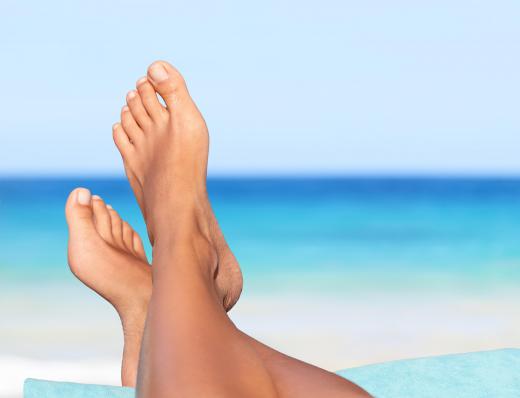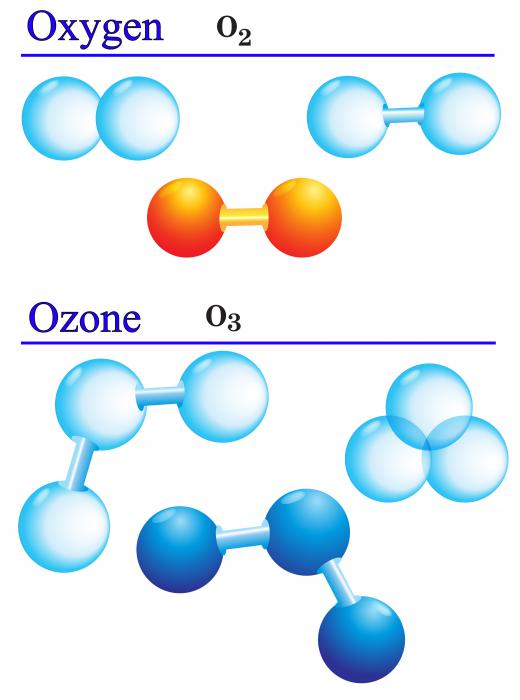What is Ultraviolet Radiation?
Ultraviolet radiation (UV) is a specific range of light on the electromagnetic spectrum. It is invisible to humans because its wavelength range is beyond the limit of human perception. UVs are known to cause sunburn, but they also have beneficial effects on human health. The sun emits much ultraviolet radiation, but most of this is blocked from reaching Earth's surface by the ozone layer. Applications of UV technology are widespread in modern developed countries.
The German physicist Johann Wilhelm Ritter discovered ultraviolet radiation in 1801 by observing sunlight's effects on silver salts. He noticed that light with a wavelength just beyond that of visible violet light induced a chemical reaction in certain compounds. Electromagnetic radiation is divided into groups based on a property called wavelength, which is related to the radiation's energy content. The term "chemical rays" was soon adopted to distinguish this new form of light ray. Ultraviolet radiation is the preferred term today, and is defined to have a wavelength range of 10 to 400 nanometers.

It is known that UV rays cause sunburn and some forms of skin cancer. This occurs when excessive ultraviolet radiation is absorbed by DNA molecules, the molecules that contain genetic instructions in living things. This can cause mutations, or permanent changes in the genetic code. Healthy levels of UV exposure differ for different skin pigments, with darker skin capable of absorbing more UV radiation.

A majority of scientists agree that sunscreen can prevent sunburn in humans. For healthy UV exposure, people should use use sunscreen with an SPF rating of 30 or above, and reapply it every few hours. Babies and young children should be protected from the sun. Sunlight is most intense from 10am to 3pm, so exposure during these hours should be limited. People who spend a lot of time outside should consider wearing tightly-woven fabrics for extra protection.

Despite its detrimental effects, some level of UV exposure is believed to be beneficial. UV rays that strike the skin can induce the production of vitamin D, which has an important regulatory function for the nervous system. Vitamin D is also believed to aid in bone maintenance and growth.
Ultraviolet radiation can be produced artificially, just like visible light can. Tanning beds use UV rays to produce the same effect on skin as natural sunlight. High levels of UV can be used to sterilize, or disinfect, surfaces in hospitals and scientific laboratories. In astronomy, UV detection can give clues to an astronomical object's temperature and composition.
AS FEATURED ON:
AS FEATURED ON:
















Discussion Comments
@OeKc05 - I can remember a time when experts used to recommend wearing a sunscreen of at least SPF 15. Years after that, they started recommending SPF 30. It could be that since you heard that expert years ago, the suggestions may have changed by now. You should try a higher SPF.
I know that SPF 15 used to offer plenty of protection for me. Years later, I would always get sunburn when I wore it, so I switched to SPF 30, which worked much better.
I believe this is due to the depletion of the ozone layer. As its protection disappears, the ultraviolet rays permeate the world more directly. We need more protection today than we did even twenty years ago.
I have fair skin, and it seems that nearly all of my friends are able to handle ultraviolet radiation better than I can. They tend to tan easily, and I tend to get pink.
I have to wear sunscreen even if I’m only going to be outside for 45 minutes. Most of my slightly darker-skinned friends could get a nice golden color in this amount of time.
I know that my fair skin makes me more at risk for skin cancer than the others. I think this is because getting sunburn is worse than getting a suntan, and I have gotten far more burns in my life than my pals have.
Years ago, I heard an expert on ultraviolet radiation say that any sunscreen above SPF 30 could not really offer much extra protection. I really wonder if this is true.
My husband and I like to go to the lake, but we always get a little bit pink from the UV rays, even though we wear SPF 30 sunscreen. Next time we go, we are going to try one with a higher SPF, like 50 or 70.
Even though we use the spray-on kind, I have a feeling it may be coming off when our skin sticks to the floats. It kind of feels like we have to peel our skin off the things. However, this type of sunscreen is hard to scrub off, even in the shower with soap, so I’m not sure what’s happening to cause us to burn.
When I stay out in the sun just a short while, I can actually feel its goodness in my body. The warmth penetrates my skin, and maybe the healthy, happy feeling I get is from the vitamin D.
I don’t stay in direct sunlight long enough to burn. I love being in the sun on fall and winter days, when it is far enough away that I can stay out a little longer without needing sunscreen.
My mother’s doctor actually recommended that she get some sunshine because of her vitamin D deficiency. I know that being outdoors for even just 20 minutes a day did a lot to lift her mood as well as her vitamin level.
Post your comments